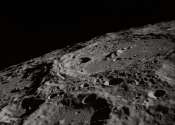Image: Testing satellite marker designs
Akin to landing lights for aircraft, ESA is developing infrared and phosphorescent markers for satellites, to help future space servicing vehicles rendezvous and dock with their targets.

Akin to landing lights for aircraft, ESA is developing infrared and phosphorescent markers for satellites, to help future space servicing vehicles rendezvous and dock with their targets.
Space Exploration
Apr 25, 2019
0
15

Two NASA CubeSats teamed up on an impromptu optical, or laser, communications pointing experiment. The laser beam is seen as a brief flash of light close to the center of the focal plane, to the left of Earth's horizon.
Space Exploration
Apr 10, 2019
1
33

A new, first-of-its-kind space weather model reliably predicts space storms of high-energy particles that are harmful to many satellites and spacecraft orbiting in the Earth's outer radiation belt. A paper recently published ...
Space Exploration
Apr 9, 2019
1
690

Since 2012, engineers at EPFL's Space Center have been hard at work on a new junk-clearing satellite to capture debris orbiting the earth. The team has now shifted up a gear, founding a company called ClearSpace to pick up ...
Space Exploration
Apr 5, 2019
0
30

A little piece of technology is making a big splash in Australia's space industry. So what on (and off) Earth is a CubeSat?
Space Exploration
Mar 14, 2019
0
12

NASA is putting its money on the moon, preparing for what the space agency says will be the nation's long-awaited, sustainable return to missions outside of Earth's orbit.
Space Exploration
Mar 13, 2019
3
21

An Israeli spacecraft rocketed toward the moon for the country's first attempted lunar landing, following a launch Thursday night by SpaceX.
Space Exploration
Feb 22, 2019
0
39

Work has begun on a new CubeSat mission that will demonstrate for the first time a new, highly promising technique for measuring soil moisture from space—data important for early flood and drought warnings as well as crop-yield ...
Space Exploration
Feb 21, 2019
0
11
Scientists who study the solar system tend to ask big questions: How was our solar system formed? Where did the building blocks of life come from? What hazards from above threaten life on our planet? To find answers, they're ...
Space Exploration
Feb 18, 2019
0
9

In December 2018, Thomas Zurbuchen, associate administrator for NASA's Science Mission Directorate, visited Boston University to discuss funding opportunities with faculty and researchers. While on campus, he also gave a ...
Space Exploration
Feb 1, 2019
0
15